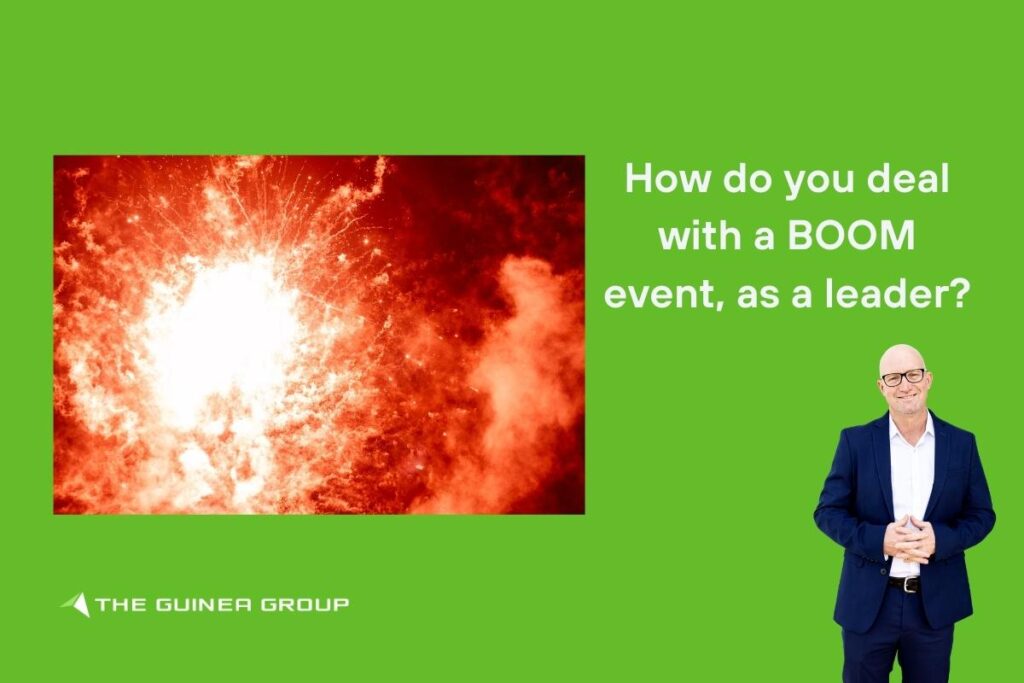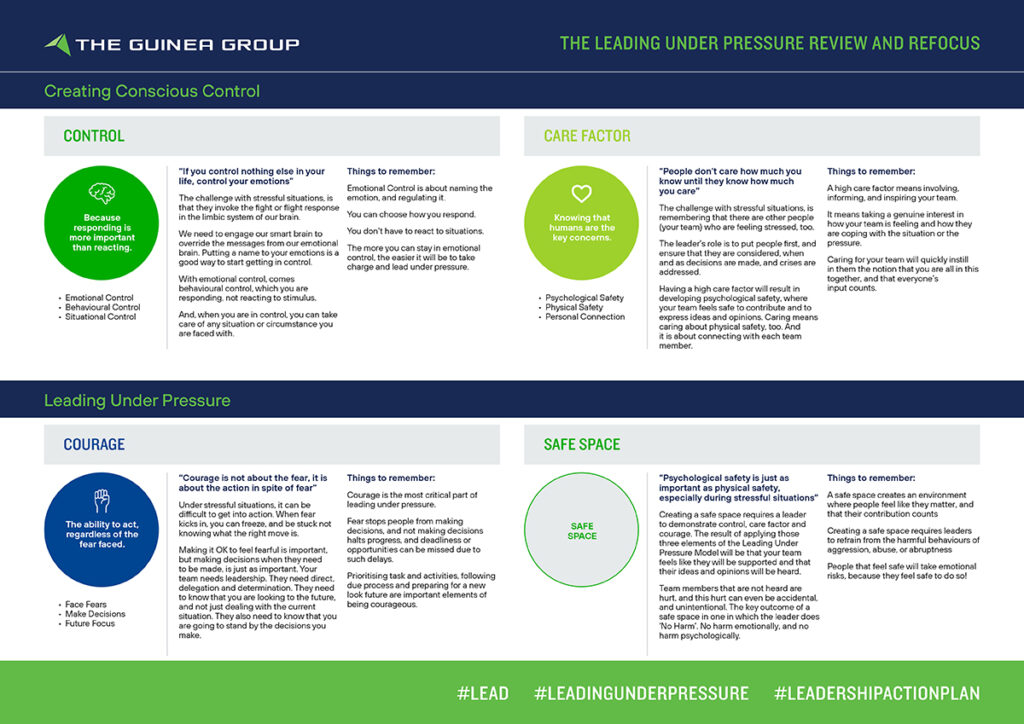Anton Guinea
Entrepreneur, Speaker, bestselling author, and founder of The Guinea Group of Companies. For over 15 years, Anton has helped leaders move their teams to become psychologically safe, physically safe and overall better versions of themselves.

How do you deal with a BOOM event, as a leader?

There will be times in a leader’s life when things go BOOM. When there is a critical or a crisis event that needs to be coordinated and managed. An event that throws the leader’s life or team into either short- or longer-term turmoil.
BOOM events can take the form of everything from the resignation of a key staff member right through to a Dreamworld scale event, like what happened in 2016. Where lives were lost. It could be a business continuity or economic event. Or it could be a personal crisis, like a workplace incident or injury or a major illness or diagnosis. It could even take the form of a mid-life crisis, which is not uncommon (and is happening at all ages now; just ask millennials, who are looking for purpose, and leaving their jobs to find it).
Regardless of the event, and the longevity of the event; as a leader, these are the times when you will need to demonstrate your leadership under pressure and lead through the event with created conscious control (emotional, behavioural and situation control) and do what it takes to ensure the physical and psychological safety of your team.
You will notice that this blog post focuses on the people elements of leading under pressure, through boom events, not so much the process side (will cover off on that in another blog post).
So, what are the key skills required to lead under pressure, with created conscious control, while building a high performing team! Control, care factor, and courage are the key skills required – as shown on the below image (and expanded on in the blog).

Note that we use this image as a self-diagnostic tool, to determine an action strategy for your next BOOM event (or your current one). There is a link below, to jump into my calendar.
1. Create conscious control
Here is some psychology, and some detail that is based on a Master of Research report, that I am currently writing (as part of what will eventually become a PhD level study program):
A conscious leader (as opposed to a leader in conscious control) is a leader who has developed an elevated level of thoughtfulness, awareness, and intentionality. The concept of the conscious leader was described by Mackey, McIntosh, and Phipps (2020), who detailed the key elements of a leader who has developed a conscious approach to their leadership. These elements included a purpose driven approach, which focuses on vision and virtue, mindset and strategy, and people and culture. The journey to consciousness is considered by Mackey, McIntosh, and Phipps (2020) to be a transformational one, that requires self-interrogation and self-development. A conscious leader can be purposeful but may lack the control required to deal with both the external and internal challenges that they face. Being conscious is an important leadership skill, as is being in control (internally, and externally).
Conscious control, as a concept, was first considered and detailed in contemporary literature by Alexander (1923). He believed that the next, and most important, stage of human evolution included the development of controlled thinking and controlled behaviour. Alexander’s proposition was that all individuals have an instinctive (feeling) and a conscious way of living (reasoning). And that to improve our psychological functioning, it is necessary to align our psycho-physical processes, which will enable us “to bridge the gap between the instinctive and the conscious way of living” (p. vii).
And until we can bridge that gap, the human will continue to be malfunctioning, destructive and will live with a herd mentality perspective. Alexander (1923) proposed the constructive conscious control was the way to ensure that humans did not make instinctive decisions, and decisions that could have disastrous consequences.
In short, conscious control is the ability to connect our feeling and reasoning functions in a way that helps a leader to be in emotional control, behavioural control, and situational (crisis event) control. That way, you can respond not react to the event.
3. Choose care factor
In the Conscious Leadership, there is a chapter dedicated to ‘Leading with Love’. “In principle, few would argue with the statement that love is extremely important in every domain of human life. And yet, when it comes to business, this core human virtue is striking in its absence. Love rarely makes the list alongside traditional leadership virtues like integrity, hard work, and courage” (p.25).
For me, leading with love is about care factor, and caring enough for the team and the team members that their needs during a crisis event become nearly as important as the leader’s own. The great leaders understand that their teams are struggling too. Critical and crisis events put pressure on everyone, not just the leader, and leaders who can prioritise the wellbeing of their teams during these times are the leaders who will care enough to create psychological and physical safety – even during BOOM events.
Caring is about being empathetic and about understanding what others are going through, and why. And how to support them. In Daniel Goleman’s terms, he talks about empathy as a cognitive, emotional, and a compassionate process. The cognitive piece is about thinking about what it might be like for the team members. The emotional piece is about feeling what it would be like for that person, and the compassionate piece is about acting. Yes, unfortunately, there is no compassion without action. “What do you need from me right now” is a good way to find out what action is required. And it might be as simple as being present for a short period of time to listen to your team members and let them tell you what they are going through.
An easy way to think about the care factor element of leading through BOOM events is to think about communicating for connection, not direction (although yes, giving clear direction is important, of course).
3. Challenge with courage
Courage is something that can be hard to define. It is contextual, as you need a different type of courage to run a marathon, than you do to do a public speaking presentation to a large crowd. You need a different courage to learn a new skill, than you do to lead through a BOOM event.
Leading through a BOOM event requires very specific courage. It takes interpersonal courage. The courage to try, tell and trust. To try the ideas that you have, and will need to, get you and your team through the event. The courage to tell your team how you are feeling, what your fears are, and what think is the right course of action. And the courage to trust. This is the big one. During BOOM events, more than at any other time, leaders need to be ready, willing, and able to trust their team members to follow through, to follow up, and to follow direction.
The best way to think about courage is to understand and accept that dealing with BOOM events is a scary process. There is fear involved. Fear of what could go wrong, and fear of losing a life. These are real fears. They are not to be taken lightly and they are not to be dismissed. They are important, and it is important that the leader acknowledges their own fears. Then, acts despite the fear, with interpersonal courage, to lead the team, and lead the humans involved. Who are all feeling the same fear and looking for guidance and an example of how to behave and how to get through the current challenges.
At TGG, our mission is to help leaders to create conscious control. And to be better at leading under pressure, so that they can build psychologically and physically safe teams.
Please click the image below if you’d like to chat about what leadership means to you.
If you would like to learn more about Anton or The Guinea Group, please click here to book into Anton’s calendar, to:
UPGRADE your Mindset
UPSKILL your Leadership
UPLIFT your Teams
About Anton
Anton has dedicated his working life to helping leaders to upgrade their mindset, upskill their leadership, and uplift their teams! With a focus on helps leaders to better lead under pressure. Anton is an entrepreneur, speaker, consultant, bestselling author and founder of The Guinea Group. Over the past 19 years, Anton has worked with over 175+ global organisations, he has inspired workplace leadership, safety, and cultural change. He’s achieved this by combining his corporate expertise, education (Bachelor of HR and Psychology), and infectious energy levels.
Work With Anton!
Sources:
Subscribe to our Newsletter
